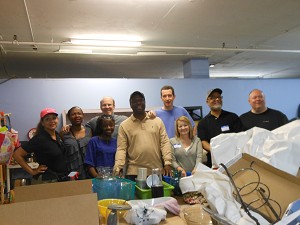By Dennis Powell, e-Management

e-Management supports A Wider Circle, a charity focused on eliminating poverty. What are your favorite causes or charities? #mypriority #AWiderCircle
Charitable giving which includes financial support, in-kind donations, and volunteering can be one of the most fulfilling things anyone can do. Yet, there are actually some charities that take advantage of the public’s generosity. How are a few nonprofits getting over on donors? Well, CNN reported that the “nation’s 50 worst charities” wastefully paid fundraising companies almost $1 billion during a 10-year span. Even more concerning, these same 50 charities gave “less than 4% of donations raised to direct cash aid.” In other words, if I give $100 to my favorite cause, only four dollars go to programs that support real action.
So, how can consumers find charities that focus on maximizing donations for people and causes rather than consultants and executives? e-Management has gathered a few tips that may help anyone who is thinking about giving to charities…
- Confirm that the charity is real. The Charity Navigator—a nonprofit with the mission to help empower people to give intelligently—recommends donors confirm the 501(c) (3) status of charities prior to committing any dollar to a cause. In the United States, 501(c) (3) organizations are tax-exempt nonprofits that meet special requirements under Section 501(c) of the United States Internal Revenue Code (26 U.S.C. § 501(c)). Donations to these organizations are tax-deductible. According to the Charities Review Council, consumers may also be able to deduct expenses incurred while volunteering at these nonprofits as well as get a deduction on some of the cost of attending a charity event sponsored by 501(c) (3) organizations.
- Request an annual report. Not all 501(c) (3) organizations are run efficiently to maximize dollars that support their causes. CNN exposed a Florida based charity that raises millions of dollars every year, yet it spent “less than 3 cents on the dollar helping kids.” In contrast, e-Management works with , a 501(c) (3) with only 2% overhead (operational expenses) and the charity is committed to using fundraising dollars to directly “serve those in poverty.” Clearly, A Wider Circle is putting its donations toward advancing its mission! Donors can get financial information about charities by requesting an annual report or a statement of activities. An annual report gives donors insight into how a nonprofit uses its resources and oftentimes showcases the successes of their programs. Some annual reports will even explicitly list top donors, which may offer additional peace of mind for donors.
- Build a relationship with your charity. Charities are living organizations that may experience highs and lows. Many nonprofits rely heavily on private donations. Once a charity has been qualified as a 501(c) (3) that provides services to advance its mission, consumers may want to consider setting up automatic and periodic donations (e.g., monthly, annual) to their trusted charity. Donors may even consider volunteering a few hours every week or month. Another option for donors is to find out how they can become social media advocates to help their cause secure additional supporters, volunteers, and donors. Supporters of charities may also want to attend annual fundraising events and invite their family and friends to buy tickets. Seasoned leaders, managers, directors, or executives may want to consider joining planning committees or boards of advisors/directors of their favorite charities to ensure of the organizations’ long-term success.
- Learn about new charity scams. It seems as if every day there is a new online or telemarketing charity scam that targets people who want to make the world a better place. The good news is that the Federal Trade Commission (FTC), the consumer protection agency, makes identifying such scams easy. Donors can visit the FTC website, which gives consumers a Charity Checklist to help them avoid costly scams. Click for more information. It’s that simple!
What charities or causes are right for you?
Forbes magazine ranks the in the countries based on private support and other criteria. The on the list are United Way, Salvation Army, and Feeding America. (1) Did your favorite charity make it on the Forbes list? (2) What are your favorite causes? (3) What do you look for in an organization when you donate?



